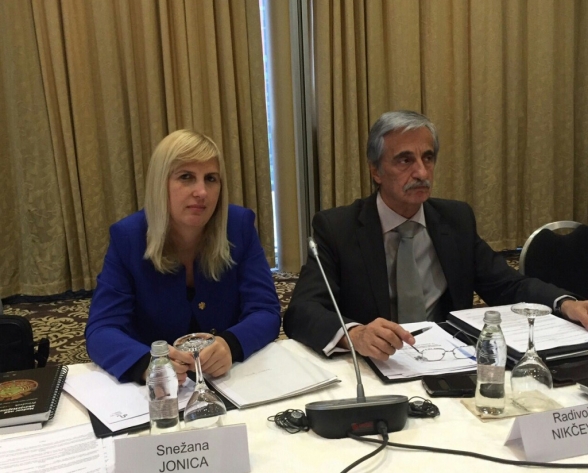Delegation of the Security and Defence Committee of the Parliament of Montenegro on this occasion was composed of Deputy Chairperson of the Security and Defence Committee Ms Snežana Jonica and member of the Committee Mr Radivoje Nikčević.
The gathering was aimed at considering the current state of affairs in the field of work of intelligence services in the Western Balkans countries, and, on the basis of sharing experiences, providing a forum to parliamentarians for creating preconditions for improving the accountability and respecting the rule of law in the work of intelligence services.
Through the interactive discussion of participants, "Regional parliamentary roundtable on overseeing intelligence services in the Western Balkans" provided a framework for the exchange of lessons learned, best practices and challenges that the participating countries had faced in the process of implementing the parliamentary oversight in the above areas and gave a contribution for finding a model for its improvement.
The first session of the roundtable was devoted to presenting the modalities of parliamentary oversight over the legality of work in this field and lessons from national experiences in this regard. On the occasion, representatives of the participating countries presented results of the committees’ work, the most important experiences, effective oversight practices, but also challenges and restrains that they had been facing in their work.
This was followed by a discussion largely focused on the scope of competences of the regional committees as well as aspects of the intelligence work, namely: policy, organisation of administration, appointment of directors, legality and respect of human rights in this regard, implementation of the budget, the international exchange of information and cooperation. In the context of the above, the participants of the meeting paid a special attention to the most efficient modes of parliamentary oversight for achieving accountability in the intelligence sector, such as consultative and control hearings, visits, surveys, discussions on the annual activity reports, requests for the submission of special reports and interpellation instrument during the plenary sessions.
Within the second session on the topic “Use of intrusive methods for collecting information”, presentations were made by Mr Peter Gill, Honorary Senior Research Fellow at the University of Liverpool, and Mr Andrej Rupnik, DCAF Assistant Director and Programme Manager. This was followed by a discussion devoted largely to use of intrusive methods for collecting information in the Southeast Europe, with a special reference to the issue of overseeing the electronic communications,
The third session was devoted to the topic “The role of intelligence services in combating violent extremism and fighting terrorism" and the following delivered speeches on the occasion: Executive Director of the Global Community Engagement and Resilience Fund (GCERF) and research fellow at the Geneva Centre for Security Policy (GCSP) Mr Khalid Koser, as well as Honorary Senior Research Fellow at the University of Liverpool Mr Peter Gill.
In the context of debate on this topic, parliamentarians discussed European and Western-Balkan approaches of mitigating terrorist threats and preventing ideological influence of violent extremism, and on this occasion, they jointly stated the need for differing activities against radicalisation aimed primarily to preventing this phenomenon among vulnerable population from the activities of de-radicalisation aimed at re-education of terrorist deprived of their liberty.
The fourth session of the roundtable was devoted to the topic “Accountability in international intelligence cooperation”, during which the following delivered speeches: Senior Adviser of the Intelligence Oversight Committee from Norway Mr Njord Wegge, Director of the Institute of Advanced Study at the University of Warwick Mr Richard Aldrich and PresidingMemberof theParliamentaryCommitteeinvestigatingtheNSAaffair and member Committee on the Digital Agenda.
On the basis of conducted discussion, the participants of the gathering stated that the international cooperation aimed at effective discovery and prevention of contemporary security threats to national security had a leading role, thus recognising its importance and timely undertaking of activities with regard to that represented an important elements of this process. A part of the subject discussion was devoted to potential violation of human rights and, with regard to that, the importance of parliamentary control over the legality of work of intelligence services in the context of using powers by members of services based on positive regulations.
During the final session, the results of the roundtable were presented to the participants, afterwards the Conclusions based on the conducted discussion were adopted.








